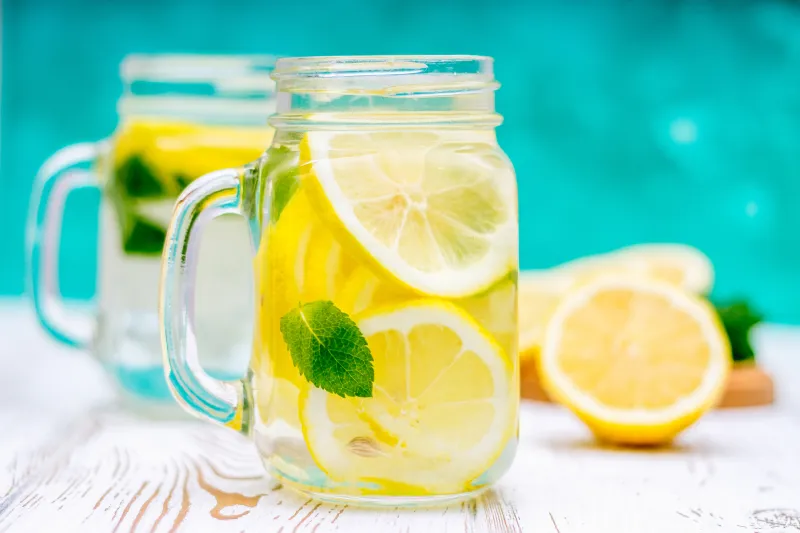Ever felt like your lungs were hosting a mucus party, and everyone was invited? If you’ve dealt with this, I’m guessing it wasn’t precisely the gathering you’d hoped for. Phlegm can feel like an unwelcome houseguest that’s overstayed its welcome.
You’re probably wondering if there’s anything else besides those over-the-counter drugs that make promises they sometimes fail to keep. And let me tell you – yes, there is!
I know because I’ve been on a quest, hunting down nature’s best remedies to clear up all that stubborn phlegm and mucus from our lungs. And what did I find?
Even something as simple as a deep breath can hold immense power, just like radishes! Sounds odd, right? But it’s true – these crimson wonders pack quite the punch. And let’s not forget about calcium-rich foods that help keep our bones strong and sturdy.
Or onions? Who knew they were secretly superheroes in disguise? They’re loaded with antioxidants and have incredible health benefits to boot! Plus, honey has sweet healing properties, and lemon juice gives a refreshing zing.
It seems the most straightforward things often offer surprising amounts of goodness.
The Limitations of Over-the-Counter Mucus Medications
Over-the-counter mucus medications might seem like a quick fix, but they have drawbacks. Using these meds can cause adverse reactions, such as decreasing the body’s natural capacity to fend off sickness.
For instance, excessive use may weaken the immune system’s ability to combat infections naturally. Think about it this way – if you constantly rely on crutches for walking, eventually, your legs will lose their strength.
Funny as it sounds, our bodies work in similar ways. Our immune systems need practice, too. Relying heavily on over-the-counter meds can be akin to keeping your immune ‘legs’ inactive and untrained.
The Power of Exercise in Clearing Mucus
When clearing mucus from your lungs, exercise plays a pivotal role. Specifically, targeted breathing techniques can work wonders.

The Role of Deep Breathing
Deep breathing exercises are more than just calming – they help mobilize trapped mucus. How does this work? When you take deep breaths, the air pressure changes inside your chest.
This change helps dislodge mucus stuck in the lower part of your lungs and move it upwards, where it’s easier to cough out.
Studies have demonstrated that alternating between regular and deep breaths during physical activity can amplify the advantages of taking deep breaths, which is particularly beneficial for individuals with persistent respiratory ailments like bronchitis or cystic fibrosis who generate an abundance of thick mucus.
Studies show that alternating between regular and deep breaths during exercise can further enhance this effect. So next time you’re working up a sweat, remember: Breathe deeply.
Natural Remedies for Clearing Mucus
Natural remedies may be a better option than OTC medications for clearing mucus from the lungs, as they not only avoid potential side effects but also help strengthen your immune system.
Natural treatments can help prevent adverse reactions while boosting your body’s defenses.
The Potency of Radishes
Take radishes, for instance. They have an uncanny ability to pull mucus from deeper tissues in our body.
Research shows that incorporating this potent vegetable into your diet could relieve you if you’re struggling with excess phlegm or a persistent cough.
Calcium’s Effect on Dry Coughs
Dry coughs without mucus are another common respiratory issue that can benefit significantly from calcium intake. Studies suggest this essential mineral effectively treats dry coughs by promoting better lung function and overall health.
No matter what type of respiratory issues you face, remember that nature provides many powerful remedies at our fingertips.
The Benefits of Onions in Mucus Clearance
Have you ever had a chesty cough and felt like you needed to clear your lungs? Well, onions might be the natural remedy you’ve been looking for. Packed with sulfur, they act as an expectorant that helps break up mucus.
This potent vegetable also boasts a high concentration of quercetin – a natural antihistamine. This calming compound is known to soothe overactive immune systems, sometimes leading to excessive mucus production.
Research shows how these benefits combine to make onions effective at clearing mucus from our bodies. So, add some extra onion to your diet next time you feel congested.
The Healing Properties of Honey
Examine how honey, incredibly raw and Manuka honey, can suppress coughs and act as an antimicrobial and anti-inflammatory agent.
Honey, especially raw honey, is a known remedy for suppressing coughs and acting as an antimicrobial and anti-inflammatory agent. Manuka honey, in particular, contains additional antimicrobial properties and hydrogen peroxide.

The Role of Lemon Juice in Mucus Clearance
Did you know that lemon juice can be a potent weapon against mucus? It is packed with citric acid and vitamin C and can break up stubborn phlegm.
Citric acid works like a charm for thinning out thick mucus. It’s almost as if your lungs are throwing a party, and citric acid invites everyone outside. This helps clear your airways so you can breathe easier.
But wait – there’s more. The vitamin C content doesn’t just stand by idly, either. This immune-boosting superstar strengthens your body’s defenses while fighting off infections.
Try this natural remedy to reduce excess mucus or phlegm. Remember, though: while lemons are fantastic for their anti-mucosal properties, they’re part of an overall healthy lifestyle, not standalone miracle cures.
Conclusion
We’ve seen the limitations of over-the-counter drugs but also how exercise and deep breathing can be game-changers.
The natural remedy to clear phlegm and mucus from the lungs doesn’t stop there. From radishes pulling out deeper tissue mucus, calcium helping with dry coughs without mucus, to onions acting as an expectorant – Mother Nature has you covered!
Honey isn’t just for sweetening tea; it’s a healer in disguise, while lemon juice adds zestiness and immune support. These everyday ingredients are packed with health benefits and ready for action against stubborn lung congestion.
So breathe easy! With these natural remedies, say goodbye to unwelcome houseguests like excess phlegm and hello to clearer airways.
Supporting Data
https://pubmed.ncbi.nlm.nih.gov/22465384
https://en.wikipedia.org/wiki/Guaifenesin
https://ebm.bmj.com/content/26/2/57








